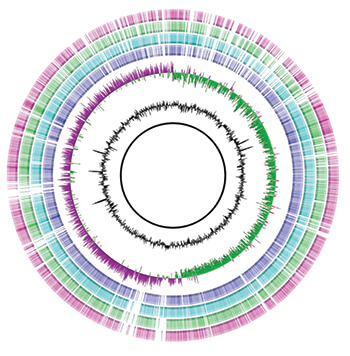 Circular alignment of bacterial genomes from Staphylococcus isolates obtained from human and animal cases.
Circular alignment of bacterial genomes from Staphylococcus isolates obtained from human and animal cases.
To probe questions in veterinary health and disease, genomic technology has become a leading tool. But these high-tech and sometimes costly approaches can prove intimidating to researchers, who may not know which technology platform best suits their purposes—and their budget—or how to extract meaningful conclusions from the massive quantities of data that result from such inquiries.
For the last five years, Penn Vet’s Center for Host-Microbial Interactions has provided researchers with a place to go to navigate these types of “omics” quandaries. Offering education, support, collaboration, and outreach, CHMI has worked to empower faculty to harness the ever-increasing power of technology to address questions that bear on both human and animal health. And looking to the future, the Center is hoping to capitalize on these advancements to revolutionize the practice of veterinary diagnostics and epidemiology.
“The technological landscape is changing quite fast,” says Dr. Christopher Hunter, Chair of the Pathobiology Department and the Mindy Halikman Heyer Distinguished Professor of Pathobiology, who envisioned the idea for CHMI after a call-out from then-Dean Joan Hendricks for “big ideas” back in 2012. He established the Center the following year in partnership with Dr. Daniel Beiting, an Assistant Professor and now the Center’s Technical Director. “The idea was to lower the barrier for faculty at the vet school to access this type of genomic technology,” says Beiting.
Five years in, the Center has made impressive progress toward that goal.
Since 2013, CHMI has offered pilot grants to support projects that might not be ready for extramural funding, but show promise. The Center has awarded $650,000 to fund these early-stage studies, investigations that have resulted in 35 peer-reviewed publications and reaped millions in external grants.
Some CHMI-supported projects have involved productive partnerships with researchers at both Penn’s Perelman School of Medicine and Children’s Hospital of Philadelphia, through the Penn-CHOP Microbiome Program.
“In the last two years we’ve dollar-for-dollar matched the Penn-CHOP Microbiome Program to fund one joint award, that includes a PI in the vet school and a PI in the Perelman School of Medicine or CHOP who are working on a project together,” says Beiting. Other projects have emerged organically, such as an investigation of the role of the microbiome in inflammatory bowel disease involving Beiting and CHOP’s Robert Baldassano, a pediatric gastroenterologist, among others.
To bring more scientists into the fold, outreach and education have been key components of CHMI. These efforts include an annual symposium, last year’s launch of the online data mining platform MicrobiomeDB, and a hands-on training course on the latest sequencing techniques.
Dr. Boris Striepen, a Professor of Pathobiology who recently replaced Hunter as the CHMI’s Scientific Director, says that future outbreaks are inevitable and we have to prepare today. CHMI will team up with New Bolton Center and the commonwealth-wide Pennsylvania Animal Diagnostics Laboratory Service (PADLS) to make Penn Vet a leader in modern veterinary diagnostics and surveillance to protect human and animal health.
In a partnership that also includes biotechnology company Biomeme, the goal is to create cutting-edge microbial assays that make use of both targeted and high-throughput sequencing technologies to accomplish a variety of tasks, from diagnosing disease, to ensuring food safety, to monitoring antibiotic resistance organisms, to tracking productivity. By training PADLS staff on these techniques, which may even utilize hand-held devices, CHMI is accelerating progress toward safer animal agriculture and public safety.
“Genomic technologies are increasingly more portable and democratized,” says Beiting.
“Sequencers are less expensive and smaller. Our researchers can be the brain trust to enable practical applications in labs or on farms, incorporating the latest and greatest approaches. That’s one of the great things about having a center like this at Penn Vet.”